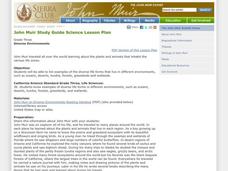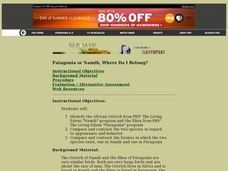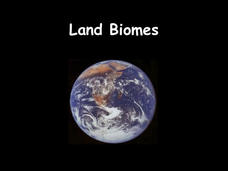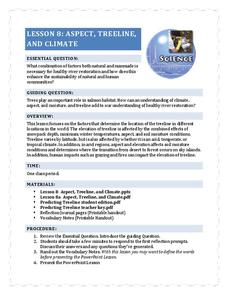Curated OER
DIVERSE ENVIRONMENTS
Third graders list examples of the diverse life forms that live in different environments, such as oceans, deserts, tundra, forests, grasslands and wetlands.
Curated OER
Forest Food Web Activity
Students gain knowledge of food webs and ecological interconnections in the forest, and place different life forms in their proper place in a food chain. Students appreciate the balance of nature and how humans are affected by extinct...
Curated OER
Geographic Landforms
Each slide is a simple notebook page with one landform in blue and its definition in red. There are 26 vocabulary terms in all, some you may want to use, and others easily hidden. It is recommended that you add photos or other graphic...
Curated OER
Plants and Ecosystems
The relationships within and between ecosystems can be explored. after examining an area for living and non-living things students complete the same examination in the forest ecosystem. Students identify abiotic and biotic elements in an...
Curated OER
Land Environments
In this land environments worksheet, students will complete a table by filling in the climate, dominant plants, and characteristic animals for 6 different habitats.
Curated OER
Ecosystems of the World
Students are able to list different ecosystems and describe their environment and organisms. They have an understanding about the function and balance of the ecosystems. Students are able to tell what type of ecosystem the St. Mary's...
Curated OER
Patagonia or Namib, Where Do I Belong?
Students compare and contrast the African Ostrich from the Namib Desert and the Rhea from Patagonia. They watch and discuss a PBS video, identify and record characteristics of each bird in their science journal, and create life-size...
Curated OER
Terrestrial Communities
Students watch a video about different terrestrial communities. They conduct an experiment with sponges conserving water. They research desert characteristics comparing them with other biomes.
Scholastic
Study Jams! Biomes
Do you know the difference between a biome and an ecosystem? Teach elementary ecologists exactly what a biome is with this captivating cartoon! It discusses six biomes: taiga, tundra, deciduous forest, desert, tropical rainforest, and...
Curated OER
You Can Depend On me
Discover the natural beauty of California. With a conservation bent, this activity delves into some of the attributes that make this state unique. Learners discuss Yosemite and the forest habitat. They focus on the things plants and...
Curated OER
Jumanji
Third graders read the book, Jumangi. Then they divide into groups of four or five and choose a habitat - desert, wetlands, Arctic/Antarctic, etc. Then each group can research the habitat to learn what kind of animals live there.
Curated OER
Habitats Black and White Pictures: Farm, Forest, Wetlands, Polar
In this science worksheet, students examine black and white drawings of 4 habitats: farm, forest, wetlands and polar. There are no questions on the page.
Curated OER
Guetemala's Changing Forest
Eighth graders compare their local ecological zone to the tropical rainforest. In this natural ecology lesson, 8th graders complete an activity about the differences in ecological zones. They compare their biome to the Guatemalan...
Curated OER
Forest In A Jar
Tenth graders are introduced to the process of succession and gain awareness of the changing nature of ecosystems. They demonstrate a comprehension of the dynamic nature of ecosystems, including the relationship between ecological...
Curated OER
Animals and their Habitats
This animal habitat PowerPoint provides beautiful photographs of a rainforest, desert, and grassland habitat, as well as animals native to a rainforest and the desert. The first slide lists rainforest, desert, tundra, and grassland as...
Curated OER
Comparing and Contrasting-Grassland, Desert, and Forest Elephants
Middle schoolers compare and contrast different types of elephants. In this environmental science lesson, students examine the characteristics of three species of elephants. Middle schoolers view a video of each type of elephant to...
Curated OER
From Forest to Farm and Back Again
Pupils review and discuss a given set of questions regarding ecosystems. They analyze essays, maps and historical documents on timber harvesting and regeneration and then complete worksheets.
Curated OER
Potential Consequences of Climate Variability and Change
Students examine the potential impact of climate change to agriculture, coastal areas, forests, water, and human health. They hypothesize what might happen to a sugar maple forest and hold a debate about global warming.
Curated OER
Biomes of the World (and Canada)
Students explore environments by analyzing food chains. In this biome identification lesson, students define a list of environmental vocabulary terms such as tundra, rain-forest and desert. Students create a fictional self sustainable...
Curated OER
Exploring Biomes
In this biomes worksheet, students visit the Science Spot website at http://sciencespot.net and use additional links provided to complete a chart about the various biomes.
Curated OER
Take a Tour of a Biome
Young scholars create a website illustrating their knowledge of a particular biome. In this combined science, language arts and technology lesson, students discuss what they already know about biomes, and then are divided into groups of...
Biology Junction
Land Biomes
Biomes share similar climates and ecosystems, despite being separated geographically on the planet. A presentation introduces the six most common land biomes. It focuses on the commonalities in climate, plants, and animals with many...
National Park Service
Aspect, Treeline, and Climate
Head to the treeline and beyond to examine how this feature of the landscape affects weather and climate, which gives scientists clues about its health. Class members' observations of photographs provide the data that drives the...
Curated OER
Animals Around Us
Young scholars view and discuss a Discovery Channel video that compares the animals found in four different habitats. They compare and contrast the characteristics of forests, deserts, wetlands and grasslands then choose one to depict...

























